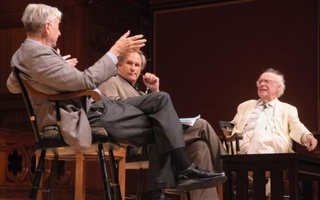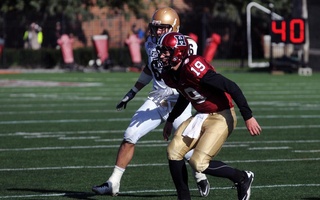Ever since I was a little kid, I would drag myself out of bed at 7:30 on Saturday mornings to watch ESPN College Gameday, college football’s only show that broadcasts live in front of a crowd of rowdy college students cheering on their alma mater’s team. I was never one to sacrifice sleep, but come college football season, sleep always took a backseat to the pigskin.
College Gameday was my pregame for all of Saturday’s big showdowns—no football game could be watched without the analysis, behind-the-scene features and predictions from hosts Kirk Herbstreit, Lee Corso, and Chris Fowler, three charismatic guys who really know their football.
But beyond the fight songs, the eye candy (SEC coeds, anyone?) and the X’s and O’s, Gameday introduced me to an aspect of the game that truly got me hooked on college football: rivalry.
In no other sport does rivalry matter more to a team and its fans, where a player’s legacy is defined by his performance against the hated archrival, where a disheartened fan finds his BMW 750 sedan torched on fire by fervent Buckeye fans because the license plate gave away that he was from Michigan.
My entire perception of college was shaped by what I saw on Saturday mornings, and by my junior year in high school, I was determined to attend a school where football mattered as much as academics. Like my dad, who had joined the ranks of the Buckeye faithful after attending Ohio State, I too wanted to become a living piece of a heated football rivalry.
By coming to Harvard, I guess some things just weren’t meant to be.
As a freshman last year, I had no problem accepting the fact that our football team wasn’t exactly loaded with blue-chippers who could run 4.3-second forties. What bothered me, however, wasn’t how we played football, but how we—as a student body—didn’t care very much about the sport. Despite the Crimson’s absolute dominance in the Ivy League in recent years, the fan support just wasn’t there.
Then everything changed that third Saturday of November.
The Game had finally arrived.
With a good enough excuse to lay off the books, unfinished papers and problem sets, we showed up in full force for the first time all season to watch our Crimson athletes fight valiantly against the despicable Elis from that community college down south.
Sure, the game was sloppy and boring to watch at times, the weather was wicked cold and Ivy League football was still, for lack of better words, Ivy League football. But that didn’t matter.
What mattered was that for once, ten thousand men (women, and alumni) of Harvard wanted victory that day. A win would give fair Harvard not only a share of the Ivy League title but another year’s worth of bragging rights over Yale—a prize arguably just as coveted. If only for a weekend, Harvard had the same swagger and gameday atmosphere of schools like USC or Florida.
Looking back, my first Harvard-Yale experience was the defining moment of my freshman year. I came away from it surprised and excited at the same time, because I simply did not expect that type of passionate rivalry to exist in the Ivy League. But as I did more research, I’ve come to realize just how storied of a rivalry Harvard-Yale really is.
For starters, The Game has history.
From Walter Camp, a Yale grad often referred to as the “father of American football”, to the Yale Bowl—the inspiration for the iconic Rose Bowl, Coliseum and Michigan Stadium—Harvard-Yale’s contribution to college football has been significant.
Read more in Sports
Stalwart Defense Gives the Crimson the TieRecommended Articles
-
 Scientists Recount Their Shared Pasts
Scientists Recount Their Shared Pasts -
 Rivalry Between the Ivy League...and the ACC?
Rivalry Between the Ivy League...and the ACC? -
SPORTS BRIEF: Women's Water Polo Game CancelledLast night at Blodgett Pool, months of anticipation were set to culminate in a fiery match between bitter rivals as the Harvard women’s water polo team faced Brown for the first time this season. But the anticipation ended in disappointment and frustration when the match was unexpectedly cancelled.
-
Scouting the Area: Princeton, N.J.Princeton is coming to town.
-
 LIVE BLOG: Football vs. Princeton
LIVE BLOG: Football vs. Princeton -
THE BROTHERS SAMUELS: The Game Is Not Even "A Game" AnymoreDid you know that The Game used to be a rivalry? A long time ago, it was a back-and-forth battle between two great Ivy League football powers in a nationally recognized showdown of brains and brawn. On Saturday, Harvard vs. Yale will just be an embarrassment. Like Yale football coaches vs. The Truth (or the Rhodes Trust—either one). Like New Haven vs. A Safe Place To Live. Or like Fareed Zakaria vs. Journalism.













